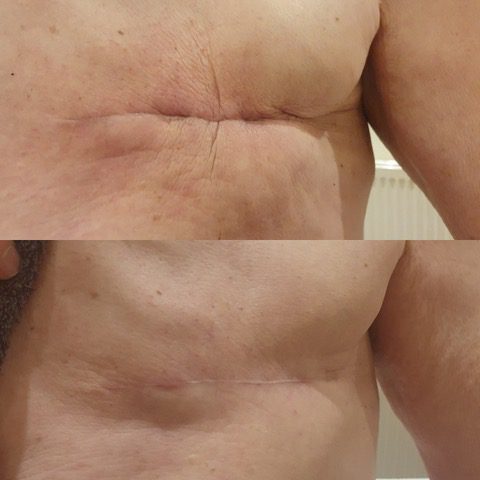with Elaine Tomkins MIFPA TIDHA MCHNC MFHT
Elaine has over 25 years of experience in the field of massage and is currently head of training for Neal’s Yard Remedies and develops and delivers a wide range of training courses in the UK and overseas. Elaine is highly qualified in a wide range of highly specialised treatments ranging from scar tissue therapy, intra-oral massage for TMJ, pre and post pregnancy massage, deep tissue muscle release therapy, myofascial and trigger point therapy, manual lymphatic drainage and specialised massage therapy for cancer.
Her treatments are always bespoke; tailor made for each and every individual with a unique set of skills and creative offering that makes her a very popular therapist and truly an expert in her field.
Qualifications include:
- TMD therapy (intra and extra oral massage),
- Oncology Massage Therapy
- MLD
- Remedial Massage Therapy
- Myofascial Release
- Pre and Post Natal Massage
- C-Section, Hysterectomy & Abdominal Scar Immersion
- Sharon Wheeler’s Scar Work
- Management of tissue dysfunction post breast cancer
- Post Breast Cancer Scar Work
- McLoughlin Scar Tissue Release (MSTR)
- Assessing and treating post-operative mastectomy pain and rehabilitation (Royal Marsden Hospital)
Scars are so much more than just visible marks on the surface of our skin. They are part of us and our history; our testament to a time in our lives when we were injured in some way or form, planned or unplanned, often paired with unfortunate consequences that affect us physically and mentally.
Although scars rarely pose a health risk and aren’t obligated to be problematic, the physical and aesthetic discomfort that many people endure, open the door to a world of unpleasant symptoms ranging from generalised pain, pain at the site of the scar, tingling, lack of mobility, numbness, a sense of constant tugging/pulling or distress from the appearance. Scar tissue has a different textural quality than normal skin, feeling less flexible and mobile.
Scar Massage therapy can help to reduce this scar tissue build-up and promote a flatter, softer, more mobile scar, and therefore enable better movement throughout the whole body. It can also reduce the appearance of scar tissue. As a result, it not only has physical benefits including improved mobility and reduced tension in specific areas, but also helps to improve the connection with the body if there are any associated feelings of trauma that may be causing unpleasant emotions. Many surgeons will recommend Scar Massage to stimulate and boost healing, and to minimise any long-term complications.
How does scar therapy work?
Scar Therapy incorporates a full spectrum whole body experience vs. just tackling the scar tissue. Unlike traditional scar massage which acts forcefully on scar tissue, Scar Therapy utilises a variety of specifically developed techniques applied on and around the scar, working at your level of comfort. The work starts with the superficial layers and carefully moves to the deeper tissues under the scar. The techniques work to soften and release adhesions and restrictions, resulting in improved mobility, functionality and appearance.
All scars respond differently but most will appear smoother, flatter and less prominent, even after one treatment. As the dense scar tissue reduces and the tissue health recovers, nerve impairment such as numbness, pain, itching, irritation or extreme sensitivity often improves.
The age of a scar’s response is irrelevant as we are continually regenerating. The effects of each treatment encourages hydration to the scar site as the visible dips, ropey knots, lumps and bumps begin to soften and minimise, preventing and reducing fibrosis, densification and excessive stiffness.
Before and after results from receiving Scar Therapy
Scar Massage Therapy Appointments
Prices
Treatment costs start from £145 and vary according to time and complexity. Please contact Elaine who will then be able to guide your choice of treatment accordingly.
Appointments available
- Friday and Saturday
- All appointments with Elaine are at the reCentre Health Therapy Rooms at 246 Balham High Road, SW17 7AW
Booking
Please contact Elaine directly with any enquiries and to book an appointment.
Email: ebtomkins@btinternet.com
Scar Massage Therapy FAQ’s
What happens in my treatment?
Every scar is different and so requires a unique therapeutic approach based on your scars age, history, skin type, location, appearance, size, surgical technique, associated skin tension, thickness (layers of tissues affected) and you, as a person. Depending on your scar, your unique history and treatment goals, the multidisciplinary nature of scar therapy aims to improve the overall feeling, functionality and tissue quality, not forgetting you as the person attached to the scar!
A typical treatment will include an assessment of your scar and surrounding tissues to see where any restrictions or adhesions may be, followed by the use of the varying techniques that are best suited to treat your scars needs. Visual changes aside, the main function of Scar Therapy is to encourage the scar tissue to integrate with healthy surrounding tissue, encourage hydration to the scar site and to improve functionality. Incorporating the appropriate soft tissue therapy techniques to support the postural compensations that might be occurring as a result of scarring is an effective and necessary step to ensure complete integration.
Scar Therapy rarely causes any pain, even for new scars and most importantly the changes created are profound, permanent and immediate. Clients report that the sensations experienced are similar to feeling gently stretched and released with feelings of warmth and a pleasant tingling. Post treatment, there may be sensations returning to areas that have previously felt numb or a sudden awareness of physical freedom as the constant tightness or other symptoms that their scar had been causing, starts to dissipate.
How long does treatment last and how many sessions do I need?
Scar Therapy offers a wide range of bespoke and tailor-made treatment programs to suit your individual needs and current health status. A few sessions are recommended to allow time for trust to build and to get to the root of the issue. For the best results, multiple treatments are a sensible treatment option but not always necessary. This will of course vary for each individual, depending on the size, age and type of scar you have.
With established scars (4 months plus), leaving at least three weeks between treatments allows for the optimum benefit from each session to allow for any physical and emotional readjustments. Newer scars will benefit from weekly to fortnightly sessions typically lasting for about 45 mins to an hour.
What scars can get treatment?
The scars could be the result of an accident, operation or cosmetic surgery, such as:
- Hip Replacements
- Road Traffic Accidents
- Skin grafts
- Open Heart Surgeries
- Keyhole surgeries
- Facial scarring
- Knee Surgeries
- Foot surgeries
- Abdominal surgeries
- Appendix removal
- Gall bladder removal
- Caesarean section
- Hysterectomy
- Breast surgery after cancer & radiotherapy
- Mastectomy/lumpectomy
- Cosmetic surgeries (tummy tuck, breast reduction/augmentation etc)
- Spinal surgeries
- Childhood injuries
- Burns
- Amputations
- Scars from cancer surgeries
Scar Therapy (directly and indirectly) can be started as soon as the wound area has healed. The earlier treatment is administered, the better the end results.
Can you treat old scars?
Yes, it’s never too late…scars can be very mature and still improve with Scar Therapy. The surface of the scar may look nice and neat (part of the reason why keyhole surgery is popular) but damage to the deeper layers of the tissues is created internally as instruments travel into and around the layers of soft tissue.
All kinds of scars from very old to newly healed (once you have been discharged by your doctor) can be treated using Scar Therapy. It is important that before treatment scars are healed, dry and infection free
I have a new scar, when can I start scar therapy?
New scars should be fully closed and dry, with no signs of inflammation or infection. Direct Scar Therapy (on the scar) can start around 8 –10 weeks post-op or when you have been discharged by your Specialist. Basically, if you are not suffering from any condition where soft tissue mobilisation (also massage) is contra-indicated you are able to have a Scar Therapy treatment.















